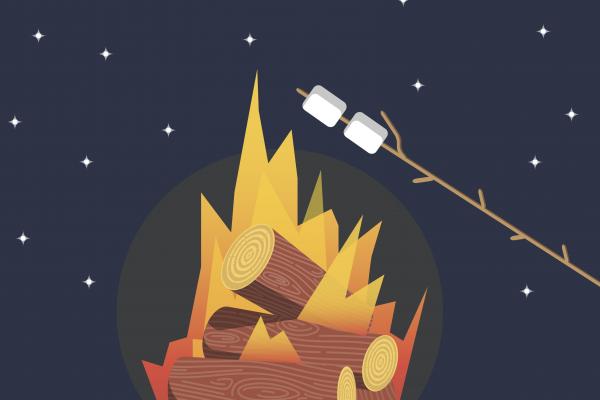AS THE STIFLING heat of summer recedes and the winter months approach, I look forward to the promise of snowy walks, steaming hot cocoa, and the sounds of sleigh bells jingling down our street. (Actually, it’s probably a garbage truck spilling bottles out the back, so never mind.) I love winter, because only in winter can I do my favorite thing: not go camping.
Yes, I know, lots of people camp in the winter. Some of my office colleagues are never happier than when their breath crystallizes in front of them as they hike through a wilderness in February, the frozen ground crunching beneath their feet. Me, I prefer the Great Indoors, thick terry-cloth robes, and the crunching of small Lego pieces beneath my slippers, a reminder that little girls should pick up their toys when they’re done. Winter hiking is what I do between the kitchen and the living room, and then back again because I forgot something.
To me, winter is nature’s way of telling us “mmphremshth,” which I can’t hear clearly, because I’m indoors and the windows are closed. But I think it’s telling us to stay inside.
I’m not opposed to camping—I camped twice last summer—but I also don’t hesitate to call it what it is: an exhausting exercise in 18th-century drudgery, but without the helpful oxen. Camping in a tent, with a family, is an unending process of menial labor that begins with deciding what to pack for the trip: everything except the couch. And then consists of an unalterable pattern which, in its entirety, is as follows:
• Pack the car completely full, blocking most windows and floor space. Put bikes on back of car.
• Remove bikes to get something inside back of car. Put bikes on back of car again.
• Drive, uncomfortably, for hours, although the stop at Dunkin’ Donuts was nice. (We had a coupon, but it was in the back of the car.)
• Unpack the car. Set up the tent, which sleeps six and, in the critical eyes of Elizabeth Warren, is too big to fail, certainly too heavy to carry, so I drag it out of the back of the car onto the ground, which I immediately declare as The Campsite.
• Set up a replica of our entire house, minus couch, on dirt.
• Frantically search the car for things we need but, it turns out, did not bring.
• Find salt shaker in glove compartment. (High point of trip.)
• Eat every meal outdoors, sharing food with biting and stinging insects and one frog-like reptile that somehow got inside our screen tent (a contraption that poses as our kitchen, despite having no sink, no cupboards, and no refrigerator, so no place to put my vintage photo magnets with clever sayings such as “Couch potato is my favorite vegetable.”)
• Swear I just swallowed a bug, my third of the trip.
• Wish I had a couch to lie down on.
• Pack the car for home, filling empty coolers with dirty clothes, which will later smell like bean salad. Drive, then unpack the car at home, usually by myself, because, you know, it’s been a long trip and family members would like to help but, oh look, there’s the mail.
WHY IS IT that, in a nation with so much government oversight, families are legally permitted to camp? This is a problem that common-sense regulation could easily take care of. It could be as simple as impounding cars with windows blocked by sleeping bags, or banning any products bearing the name Coleman. Or better yet, subsidize patronage of cheap motels, which come with pre-inflated beds and, in some cases, running water that you don’t have to carry back from a spigot 100 yards away, in the dark.
We tax cigarettes to discourage their use; why not tent camping? It’s not addictive, but it should still come with a warning label from the Surgeon General: “Camping can cause extreme irritability in older males. Plus, there’s no couch.”

Got something to say about what you're reading? We value your feedback!

